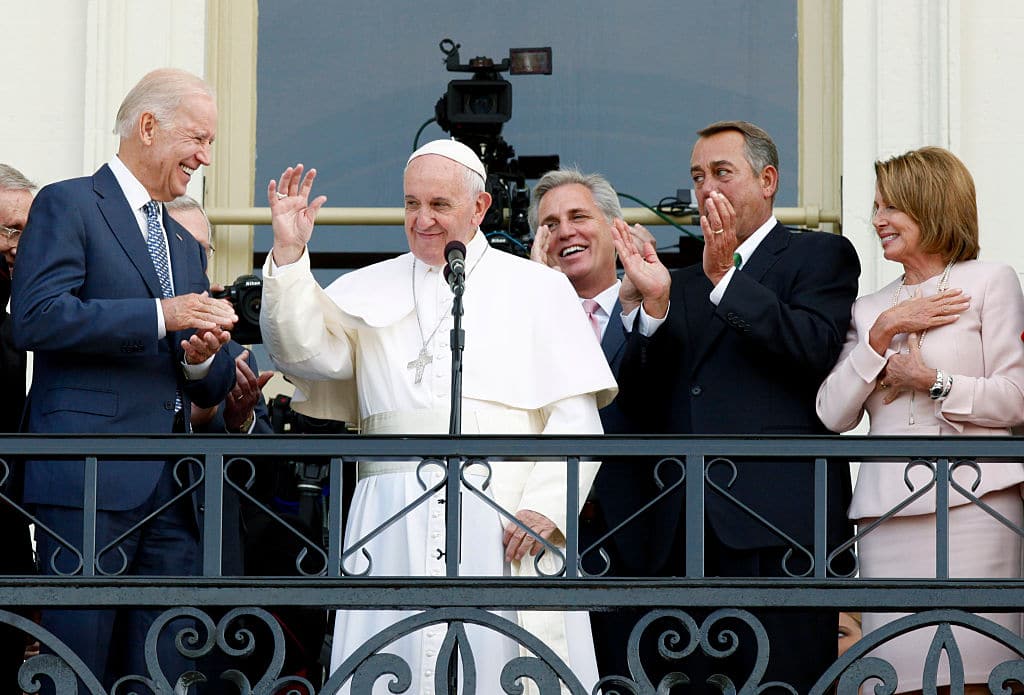As Pelosi is welcomed by Pope, has Vatican taken a side in the culture wars?
Less than a week after the US Supreme Court announced its explosive decision to overrule Roe v. Wade – returning the authority to legalise abortions to individual American states – the Pope met with House Speaker Nancy Pelosi, an Italian-American Catholic, in Rome. Pelosi later received Communion during a Papal Mass in St. Peter’s Basilica. The post As Pelosi is welcomed by Pope, has Vatican taken a side in the culture wars? appeared first on Catholic Herald.

Less than a week after the US Supreme Court announced its explosive decision to overrule Roe v. Wade – returning the authority to legalise abortions to individual American states – the Pope met with House Speaker Nancy Pelosi, an Italian-American Catholic, in Rome. Pelosi later received Communion during a Papal Mass in St. Peter’s Basilica. This would not in itself be a big deal except Pelosi is a known supporter of abortion rights and has been banned from Communion by conservative bishops in the US.
While Pelosi has been banned from taking Communion in her home city of San Francisco thanks to Archbishop Salvatore Cordileone, she remains able to take Communion in Washington, D.C., pointing perhaps to ongoing splits on abortion among US Catholics. (Three other bishops have followed Archbishop Cordileone’s decision.) To be clear, the Pope does not give Communion himself at such ceremonies and has no control over who receives it during the Papal Mass. Indeed, it was not clear if the Pope was even aware Pelosi was attending Mass at the time, although presumably the Vatican was informed in advance and could have discouraged attendance had it so chosen.
What was most striking however was the Pope’s decision to greet Pelosi separately before the Mass, a decision which can surely be understood as taking some sort of side in the US and wider Western culture wars. Although the Pope does not endorse abortion, he has accused conservative bishops of politicising Catholic office holders who oppose abortion personally but support it for others, arguing that “Communion is not a prize for the perfect.” For her part, Pelosi described the judgement in Dobbs v. Jackson’s Women’s Health Organization as “outrageous and heart-wrenching”. While publicly condemning abortion, Pope Francis instructed new archbishops to welcome everyone into the Church, and not to “remain pinned to some of our fruitless debates.”
In another move certain to alienate conservative critics, Pope Francis urged Catholics to stop exploiting the old Latin Mass for ideological reasons but instead discover the beauty of the new liturgy which grew from the reforms of the Second Vatican Council. The Pope began his crackdown on the pre-Vatican II Mass in 2021, when he re-imposed restrictions on celebrating the rite which had been loosened by Pope Benedict XVI. While Pope Francis has framed his decision in terms of unity and reconciliation, traditionalists attached to the Tridentine Rite are likely to see his recent words – coupled with his meeting with the US House Speaker – as a culture wars position.
The Pope has repeatedly spoken out against traditionalists, decrying their “rigidity”. It is also widely believed – given speculation about an imminent Papal resignation – that the Pope’s decision to host a consistory to create 21 new cardinals will be an attempt to ensure any successor will follow in his more liberal footsteps. For US Catholics, one especially significant appointment was Bishop Robert McElroy of San Diego, a progressive whose appointed bypassed conservative archbishops in San Francisco and Los Angeles. Bishop McElroy has been an outspoken ally of the Pope’s with a welcoming approach towards gay Catholics. Crucially perhaps, Bishop McElroy has also opposed clerics who want to ban Catholic politicians receiving Communion because of their abortion stance.
Although the Vatican has not ruled on the specific issue of Communion and politicians supporting abortion, Canon Law states that people in a situation of persistent sin must not be allowed to receive Communion. It has also exhorted Catholic office-holders to uphold principles consistent with Church doctrine. For traditionalists then, the Pope has taken the wiggle-room afforded by Catholic doctrine and made a very public statement about where he stands in the ongoing culture wars. Meanwhile, the Pope will know his liberal position will still be supported by significant numbers of American Catholics.
Of course, data suggests that Mass attendance is heavily correlated with a more conservative stance on abortion, suggesting that while the Pope may reach out to disillusioned Catholics, he is likely to alienate the more pious. Indeed, the Pope has also risked alienating Catholics in central and eastern Europe – the only European region where Christianity is strengthening – thanks to his stance on migration and other social affairs. In general, those parts of the world where Catholicism is healthy tend towards cultural conservatism (such as Africa, Asia and Latin America). Those Catholics opposed to the Pope will feel confirmed in their suspicions by Wednesday’s actions. While the Pope may be attempting a path of reconciliation, it cannot be lost on anyone that meeting Pelosi and making the statement he has at a time like this can only be interpreted as having taken a stand in the culture wars. Perhaps the bigger question is what stand will any Papal successor take.

The post As Pelosi is welcomed by Pope, has Vatican taken a side in the culture wars? appeared first on Catholic Herald.














